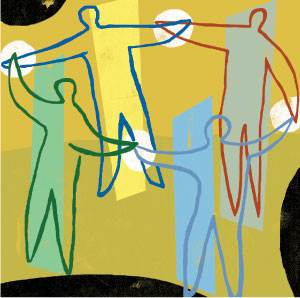Investigations
Activity Does a Mind Good
In both our professional and personal lives, many of us organize ourselves into clubs and associations. We join churches, bowling leagues and quilting clubs; we coach soccer teams and attend PTA meetings. Even our lives online are filled with social networking options. Belonging makes us feel good.
But more than just pleasant feelings are at stake. It turns out there is a real connection between active involvement in groups and good mental health.
For a while, literature has suggested a connection between religious involvement and mental health. Assistant Professor of Sociology Gabriel Acevedo wanted to know if involvement in civic activities yielded similar benefits. Thanks to a grant from the Hogg Foundation for Mental Health, Acevedo conducted a study on this question, one of the first of its kind.
“We wanted to see if the positive impact that we see between religious involvement and mental health can also be attributed to other nonreligious engagement, such as involvement in PTA, hospital volunteering, coaching, etc.,” he said. “What we saw is that both have an impact.”
Acevedo, whose work focuses on the sociology of religion, social theory and social psychology, enlisted the help of sociology graduate student Kim Dalton to do background research on the link between religion and mental health. He also collaborated with Xiaohe Xu, professor of sociology and new member of the UTSA faculty. Xu is well known as a methodologist and a family sociologist.
Acevedo’s research was based on a survey of a random sample of Texas adults, a survey coordinated by researchers at the University of Texas at Austin. Questions targeted religious affiliation and mental health, as well as politics, behavioral and physical health. The survey data were made available to Acevedo through the Inter-university Consortium for Political and Social Research, of which UTSA is a member. In addition to analyzing the survey data, Acevedo contacted the UT researchers to exchange ideas.
Even when the survey responses were controlled for race, education and income, Acevedo found, the results showed that people who were actively engaged in civic organizations were less likely to suffer from mental illnesses such as depression and anxiety. The survey data, which included a large sampling of Hispanic adults, confirmed Acevedo’s theory that ethnic background was not a factor.
“Even if you take into account whether people are wealthy or poor, Hispanic or white, being engaged in both religious and secular [activity] leads to positive mental health,” he said. “People that exercise, people that run, people that go to health clubs regularly, we know they are healthier. What our research is starting to indicate is that people who are engaged may also be characterized by better mental health outcomes.”
But without further investigation, Acevedo cannot say whether involvement in groups is causing better mental health, or if people with better mental health are already predisposed to joining groups. What his results do show is the connection between the two, adding another perspective on the research about religion and well being.
“We’re not debunking religious impact,” Acevedo said. “We’re saying that other forms of involvement also have a positive effect.”
Acevedo and Xu have co-authored a paper on the results and are preparing it for journal submission. Acevedo believes the findings open avenues for future research.
A future study could take place on campus with UTSA subjects, he said. During the first few weeks of their first semester, freshmen are bombarded with signs appealing to new students to join various groups and organizations.
“I think that’s anecdotally a way of saying what our findings say,” Acevedo said. He wants to know if he would see the same correlations between involvement and mental health if a cohort of incoming freshmen were tracked over the course of their four years.
—Amanda Beck

